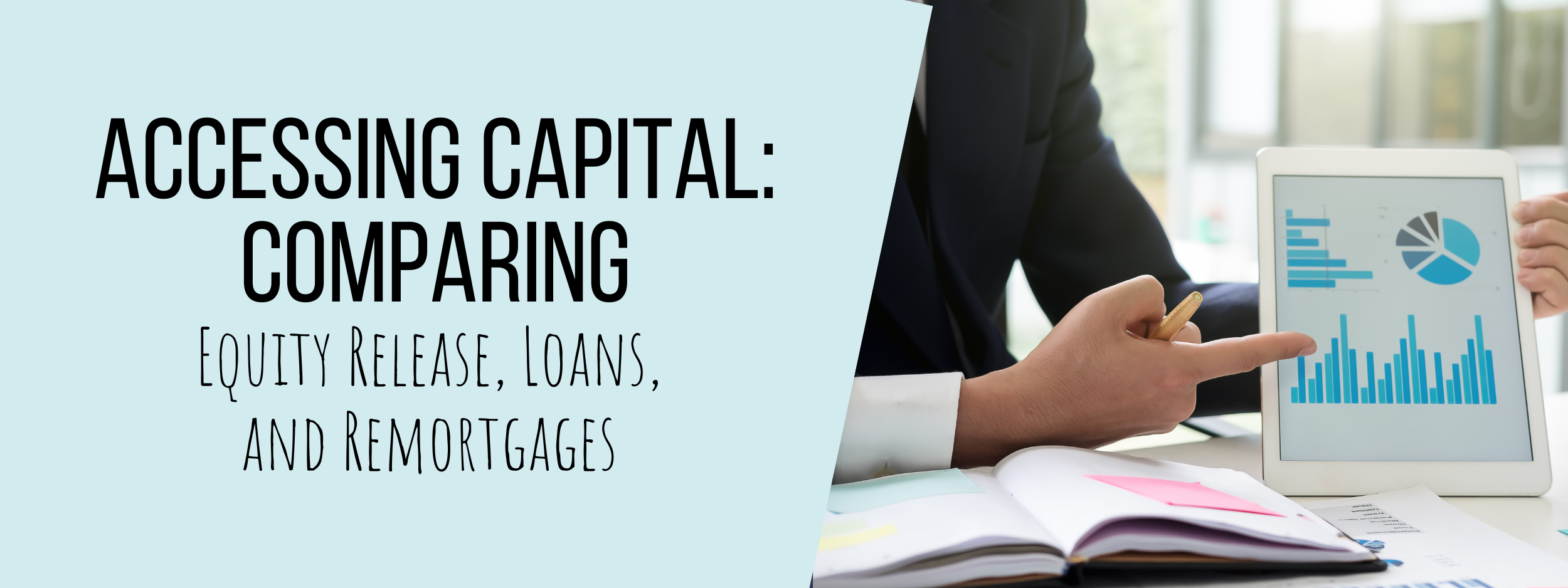
We hope everyone is having a lovely summer. We’ve put together a very information-filled newsletter this month. Firstly, we’ve looked at the new Stamp Duty changes, which see the end of the Stamp Duty relief from back in 2022. The changes happened in April, so we’ve been listening to our clients and hearing how the changes might affect you.
We’ve also covered a few FAQs, like why a cheaper insurance policy isn’t always better. What to look for in an income protection policy. Options for releasing capital. Plus, handy info on how health insurance can help you stay active and how to build your financial resilience. And remember – we say it all the time – but using an advisor is the gold standard. We know the market inside and out. Think of it this way, you wouldn’t cut your hair yourself, so leave this stuff to the experts. Give us a call or email anytime for advice tailored just for you.
Happy reading!

If you're planning to buy property in England or Northern Ireland, there’s some big news you should know about. As of April 1, 2025, the temporary Stamp Duty relief introduced back in 2022 has officially ended, and several major changes are now in effect.
For a while, buyers enjoyed higher tax-free thresholds, which made getting on the property ladder a little easier (and a bit cheaper). But from April, those thresholds have been pulled back to their pre-2022 levels, meaning buyers may now face steeper costs when purchasing a home.
For most buyers, the amount you can spend before paying any Stamp Duty has dropped from £250,000 to £125,000. That’s a pretty significant shift. And for first-time buyers, the nil-rate threshold has been lowered from £425,000 to £300,000. If you're buying for the first time and your property is valued between £300,001 and £500,000, you’ll now pay 5% on the portion above £300,000. Anything over £500,000? Unfortunately, no first-time buyer relief applies at all.
Investors have also been hit. The surcharge for buying additional properties, like a second home or a buy-to-let, has gone up from 3% to 5%. And if you're purchasing through a company or other non-individual entity, expect to pay even more: the rate for properties over £500,000 has jumped from 15% to 17%.
Unsurprisingly, the lead-up to these changes saw a surge of activity. Buyers rushed to beat the deadline, with completions by first-time buyers up 62% in the first quarter of 2025 and home movers up 74%. But once April hit, the brakes slammed on. Property transactions dropped 64% compared to March, and house prices have already started to dip – falling by 0.4% in May, according to Halifax.
So, what does this mean for you? Whether you're buying your first home, upsizing, or investing, it's more important than ever to factor Stamp Duty into your budget. These changes could impact your affordability and your return on investment, especially for landlords.
However, as we’ve seen house prices drop because of the Stamp Duty increase. And with the interest rates dropping having reduced, it could actually be a really great time to buy. If you’re unsure how the new rules affect you, chat with us to help you plan your next steps with confidence. Because when it comes to important financial decisions, having expert guidance on your side can make all the difference.

When it comes to buying insurance, whether for your car, home, health, or income, it’s tempting to focus on price. After all, who doesn’t want to save money? But while a cheaper premium may look appealing upfront, it could cost you far more in the long run. if the policy doesn’t do what you need it to. Equally, by chatting with an advisor, you’ll ensure you’ll end up with the right policy for you and your needs.
Let’s dive into the top reasons why “cheaper” doesn’t always mean “better” when it comes to insurance:
1. Lower Premiums Often Mean Lower Cover
Cut-price policies tend to offer minimal cover. That might be fine – until you actually need to make a claim. For example, if you bought a cheap contents insurance policy and unfortunately had a break-in, you might find that only £10,000 of items are covered. Plus, it excludes electronics, jewellery, and bikes. That “bargain” policy won’t come close to replacing what you lost.
2. Exclusions and Small Print Matter
Cheap insurance policies often have more exclusions. Also known as: the things they won’t pay out for. Our top tip? Always read the key facts document and ask an adviser to explain what’s not included.
3. Delays, Excesses, and Claim Limits
Cost-saving features reduce the price but can also reduce the value of the policy when you need it most. Such as:
- Higher excesses (the amount you must pay before the insurer contributes)
- Lower payout caps (especially on home, travel, or gadget insurance)
- Longer waiting periods (common with income protection or private medical insurance)
4. Poor Service at the Worst Time
Customer service can suffer with ultra-budget insurers. Long call waits, confusing processes, and slow claims payments may be more common with cheaper providers. When you're already dealing with theft, or an accident, poor service adds stress you don’t need.
Check with an advisor before choosing on price alone.
Some budget insurers might not offer legal and financial coverage. Or aspects like counselling services and family support. In contrast, more comprehensive (and slightly more expensive) policies often include these extras that can make a big difference in a crisis.
The most important question isn’t “What’s the cheapest insurance?” but “What’s the right insurance for me?”
It’s not about buying the most expensive insurance – it’s about buying the most suitable one. Sometimes that may cost a little more, but in exchange, you’ll get peace of mind, real support when you need it, and a policy that actually works for your situation.
Chat with us today to ensure you are insured where you need it.

Life can be unpredictable, and depending on your line of work, if illness or injury stops you from working, your income can change overnight. That’s where income protection insurance comes in. Offering a financial safety net when you need it most. We are specialised in helping people with income protection. We’re here to help – give us a ring and let’s talk through your options.
Understand How You’ll Be Assessed
The definition of incapacity is one of the most important parts of your policy. It determines when you can make a claim based on your ability to work.
- Own occupation: Pays out if you can’t do your specific job. This is the most comprehensive and flexible option and offers the highest level of protection.
- Suited occupation: Pays only if you can’t do a job suited to your skills or experience.
- Any occupation: Pays out only if you can’t do any job at all – the strictest definition and often hardest to claim against.
Choose The Right Deferred Period
This is the waiting period between when you stop working and when your payments begin. Common options include 4, 8, 13, 26, or 52 weeks. A longer deferred period usually means lower premiums, but you’ll need other financial support to cover the gap. Look at your sick pay or savings buffer and see how it lines up.
Check How Much You’ll Be Paid
You can usually insure between 50% and 70% of your gross income. Payments are tax-free if you’re paying for the policy personally. This ensures you can still cover essential bills like your mortgage or rent, food, and utilities, even while off work.
Decide Between Short-Term or Long-Term Cover
- Short-term cover: Pays out for a maximum of 1 or 2 years per claim. It’s more affordable but offers less long-term security.
- Long-term cover: Continues until you return to work, retire, pass away, or reach the end of your policy term – usually around age 60 or 70.
Should Your Cover Rise with Inflation?
Many policies offer the option to index-link your cover, meaning your benefit will rise each year in line with inflation… maintaining your income’s real-world value over time.
Understand the Premium Type
- Guaranteed premiums: Stay the same unless you make changes.
- Reviewable premiums: Can be changed by the insurer, often every 5 years.
- Age-banded premiums: Rise gradually as you get older.
Watch for Exclusions
Pre-existing conditions may not be covered, and some policies have exclusions for mental health issues, back pain, or pregnancy-related conditions.
Additional Considerations
- Rehabilitation support to help you return to work.
- Waiver of premium, which means you don’t pay while claiming.
- Guaranteed insurability, so you can increase your cover if your circumstances change (e.g., getting a mortgage or starting a family).
Still unsure? A financial adviser can help match your needs and budget with the right level of cover. Give us a call – we’re happy to help.

Are you looking to take a dream holiday this summer? Or do you have plans to get the garden ready to enjoy the sun? Whether you want to renovate your home, support your family, or manage debts, there are several ways to release money from your property.
This fact sheet breaks down three common options. Plus, we’ve included real-life examples to help you understand how each one works. But don’t forget, this is just a guide. We’ll go through your own circumstances in a discovery meeting to find the specific option for you.
1. Equity Release (Lifetime Mortgage)
- Best for: Over-55s who want tax-free cash without monthly repayments.
- How it works: Borrow money secured against your home; no monthly repayments needed. Interest builds and is repaid when you pass away or move into long-term care. You still own your home and can choose to ring-fence inheritance.
- Example: Margaret (68) wanted to gift £25,000 to help her granddaughter buy her first home. She used a lifetime mortgage to release equity from her home without affecting her lifestyle. There are no repayments, and the loan plus interest will be repaid when the property is sold in the future.
2. Secured Loan (Second Charge Mortgage)
- Best for: Borrowers who want to keep their existing mortgage deal.
- How it works: Take out a second loan secured on your property, in addition to your existing mortgage. Ideal if your current deal is on a low interest rate.
- Example: Tom and Priya needed £40,000 to renovate their kitchen and add a home office. Their existing mortgage was on a low fixed rate with years left. Instead of remortgaging and losing that deal, they used a secured loan alongside it.
3. Capital-Raising Remortgage
- Best for: Borrowers looking to switch deals and release funds.
- How it works: Remortgage your home for a larger amount than you currently owe. The extra money is released as a lump sum.
- Example: Jake and Olivia had £120,000 remaining on their mortgage and wanted £30,000 for debt consolidation and home upgrades. They remortgaged to a new deal worth £150,000, clearing credit cards and reducing their overall monthly outgoings.
| | Equity Release | Secured Loan | Remortgage |
|---|
| Age restriction | 55+ only | No | No |
| Keep current mortgage? | Yes | Yes | No (replaces it) |
| Monthly repayments? | Optional | Required | Required |
| Tax-free lump sum? | Yes | Yes | Yes |
| Impacts inheritance? | Yes | Possibly | Possibly |
| May affect benefits? | Yes | Possibly | Possibly |
Each of these options has pros and cons depending on your age, mortgage status, and financial goals. It’s important to consider your lifestyle. Do you need repayments now or later? Will this affect family inheritance or your benefits? Are you keeping or changing your current mortgage?
You’ll need regulated advice before making any decisions, especially with equity release. So let’s book in a discovery meeting to help you find the most suitable option for your personal needs. Hit ‘reply-to’ this email to arrange a time.
This is a lifetime mortgage. To understand the features and risks, please ask for a personalised illustration. Check that this mortgage will meet your needs if you want to move or sell your home or you want your family to inherit it. If you are in any doubt, seek independent advice.

Are you looking to feel your best this summer? It can be a self-conscious time of year, but let’s make 2025 the year you leave your worries behind. And actually enjoy swimming with the kids or sunbathing on the beach.
Did you know private health insurance can help you become more active, healthier, and more proactive in your fitness goals? Probably, because we talk about it all the time! But while most people think of health insurance as something you use when you're ill, many modern policies now include wellness and fitness benefits that get us moving. In turn, promising a healthier and happier life!
Give us a call today to see how a supportive PMI has changed our lifestyle! And we’ll cherry-pick the most suitable policy just for you.
Did you know PMI can include gym discounts and fitness rewards?
Yes really! Many insurers partner with well-known gyms and fitness brands. Think discounted memberships at PureGym, Nuffield Health, David Lloyd, or Virgin Active, and more! Alongside this, you can expect cashback or rewards for tracking exercise. Plus, even discounts on home fitness equipment, apps, and wearables.
For example, Vitality Health offers incentives like free Apple Watches and discounted gym memberships when you hit fitness activity targets each month.
Do you feel like you need extra support for nutrition and lifestyle coaching?
Think nutritionists or dietitian consultations. Wellness coaches or lifestyle planning sessions. Or mental health support, which can help give you motivation to stay active.
How does faster access to physio and sports injury treatment sound?
For some, getting moving comes with physical blocks. PMI can get this fixed before your next run. Staying active means you might face the occasional strain or injury. But quick access to physiotherapy, referrals to sports medicine specialists, and cover for treatments like osteopathy or chiropractic care can all help!
Equally, PMI means reduced waiting times for tests and treatment
You’ll skip long waits for diagnostics like MRIs or blood tests. Access consultations quickly, so problems can be addressed sooner. So you’ll get back on track faster after illness or injury!
Finally, let’s look at incentivised wellness programs
Some insurers offer reward schemes that turn healthy habits into real-world perks. These might include:
- Discounts on activewear, bikes, or sports events
- Free cinema tickets, coffee, or travel rewards for hitting step counts or gym sessions
- Wellness apps with tracking tools and personalised plans
Private medical insurance isn't just about illness. It's evolving to support whole-life wellbeing. Whether it’s getting back on your feet after injury or helping you stay fit with discounts and incentives, it’ll play a critical role in helping you live a more active life. And in turn, helping you feel more confident no matter the weather!
Do you need help finding a policy? Let’s chat and see how we can help you!

Your Money, Your Safety Net
Life can be unpredictable. Whether it's a sudden job loss, an illness, or a big, unexpected expense, being financially resilient means you're ready to weather the storm.
The best part? A lot of these you can ‘set and forget’, meaning with a budget in place, you can enjoy your holiday or drinks in the beer garden. But also know when to ‘call it’ to ensure your financial resilience.
Here's how you can start building that resilience today in practical, achievable steps.
- Start an Emergency Fund: Aim to save 3–6 months’ worth of essential expenses (like rent, bills, and food). Begin with small weekly amounts and keep it in an easy-access savings account. Some banking apps let you round up purchases to build savings effortlessly.
- Review your spending. Cancel unused subscriptions, compare utility prices, and switch providers to save. Use cashback and voucher websites for everyday purchases.
- Deal with Debt: Pay off high-interest debts first, such as credit cards. Look into 0% balance transfer deals. If you're overwhelmed, free advice is available from organisations like StepChange and Citizens Advice.
- Income Protection Insurance can replace part of your income if you’re unable to work due to illness or injury. Critical Illness Cover pays a lump sum for certain serious conditions. Some employers include these in benefit packages.
- You might be eligible for benefits. Use Turn2us or Entitledto to check on your Universal Credit, Council Tax Reduction, or Cost of Living Payments. Many people miss out on money they could claim.
- Could you explore extra income? Side hustles, freelance gigs, or renting out a spare room (via the Rent a Room Scheme) can supplement your income. Small, consistent boosts can make a big difference.
- Put money into an ISA or pension regularly. If you’re under 40, a Lifetime ISA could help you save for a home or retirement with a 25% government bonus.
- Insure What Matters: Life, home, and health insurance all help protect your financial wellbeing in the face of unexpected events.
Financial resilience isn’t about being wealthy. It’s about planning, protecting, and preparing for the unexpected, one step at a time. Ready to take the first step? Start with just one change today. Give us a call and let’s see how we can help.
Sources
https://www.covermagazine.co.uk/news/4410188/adults-unaware-monthly-spending
https://www.mortgagestrategy.co.uk/features/feature-time-to-see-a-specialist/
https://www.ntu.ac.uk/about-us/news/news-articles/2025/02/equity-release-doubled-in-the-uk-with-holidays-a-major-factor-study-shows#:~:text=Research-,Equity%20release%20doubled%20in%20the%20UK%20%E2%80%93%20with%20holidays%20a%20major,for%20purchases%20l
https://www.covermagazine.co.uk/news/4383576/womens-health-crisis-vitality
https://www.covermagazine.co.uk/news/4410180/male-employees-increased-mental-health-support



